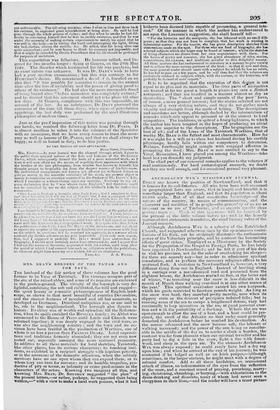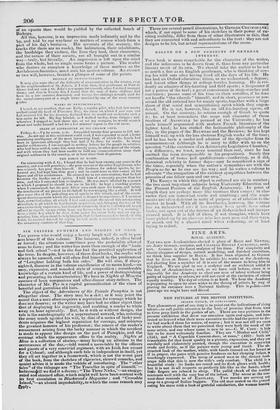ARCHDEACON WIX'S MISSIONARY JOURNAL. EVERY one knows the position of
Newfoundland, and that it is famous for its cod-fisheries. All who have been well crammed in geographical facts are aware, that in length and breadth it is,
something larger than England, and that its population is about 60,000 souls. But of all that constitutes hiff,:cledge—of the nature of the country, its means of communication, and the
character and condition of its people—the geners'oy of us are as ignorant as we are of Timblictoe, and as eegards specifle ideas perhaps more ae. Mach of this ignorance will be reteeved by the perusal ci the little volume before us : and in the homely matter-of-fact statements it contains, the chief literary value of the Journal consists.
Although Archdeacon Wise is a minster of the Established Church, and supported otherwise than by the spontaneous contri- butions of his flock, yet he strikingly illustrates the enthusiastic
power of the Voluntary principle, and by contrast the benumbing effects of great riches. Employed as a Missionary by the Society
for the Propagation of' the Gospel in Foreign Parts, he has lately
been appointed to Newfoundland ; and he felt it part of his duty. to visit his province, not for the sake of overlooking his clergy—
for there are scarcely any—but in order to administer spiritual consolation, and to perform the necessary religious offices to his scattered flock. A visitation in Newfoundland is, however, a very different thing from one in England. Instead of bowling along in a carriage over a macadamized road and protected from the slightest breeze, the Archdeacon stalled on foot, at the latter end
of winter, " as travelling over the snow is less difficult in the
month of-March than walking over-land is at any other season of the year." This spiritual overlooker carried his own knapsack,. which his guide restricted to fourteen pounds weight. As long as the snow was hard, they marched pretty merrily, save when its- slippery state or the descent of precipices induced falls; but in
crossing arms of the sea to escape a lengthened detour, they had continually to leap interstices in the ice, at great personal exer- tion and a :th the probability of a ducking. Uliere the sea was open enough to allow the use of a boat, and a boat could be pro- cured, the swell of the Atlantic on that rocky coast generally drenched the Archdeacon before he reached his destination. As the season advanced and the snow became soft, the labours of walking increased; and the power of the sun being so consider- able in the middle of the day as to render a cloak a burden, the contrast was far from pleasant when our spiritual traveller and his party had to dig a hole in the snow, light a fire with forest- wood, and sleep in the open air. To the elements Archdeacon Wise was always exposed ; he could rarely have had a dry rag upon him ; and when he arrived at the end of his journey, be was contented if he lodged as well as an Irish pauper,—although sometimes, in the larger stations, lie might meet with a degree of colonial comfort. Add to all these hardships, an occassional attack of illness, an inflammation of the eyes from the reflection of the snow, and a constant round of praying, preaching, marry- ing, christening, churching, or burying,--with exhortations to the dram-drinking and dissolute, many of whom had never seen a. clergyman in their lives,—and the reader will have a truer picture-
of an apostle than would be yielded by the collected bench of Bishops, All this, however, is an impression made indirectly and by the !by, and told by our wayfarer as matters of course which form a part of his day's business. his accounts of the scenery, the tracks (for there are no roads), the habitations, their inhabitants, the hardships they endure, the lives they lead, their characters, and the nature of their society, arc all brought out in a similar way—truly, but literally. An impression is left upon the mind from the whole, but no single scene forms a picture. The reader who desires as complete a knowledge of these matters as the Archdeacon furnishes, must seek his modest volume. Au extract or two will, however, furnish a glimpse of some of the points.
POSTAGE. IN NEWFOUNDLAND.
It may give some idea of the difficulty of communication in the winter, even in the neighbourhood of St. John's, if I state here, that gentlemen at Port de Grave had not seen a St. John's newspaper for a month, when I arrived amongst them ; and that in Trinity Bay I found that the sum of forty shillings had been DUI a late occasion demanded, and twenty-live shillings actually paid for the casual conveyance of a single letter overland by one of the cross country
WALKS IN NEWFOUNDLAND.
I heard, to my comfort, that one Kelly, a regular pilot, who hail last winter walked round the head of Placentia Bay, the route on which I now was, and Lad received It.4. for his journey, declined that be would not undertake such a trip again for hOL My dog howled, as I walked to-day, from fatigue; and, whenever I stopped to look about me, or set my compass, he would scratch about and make himself a bed for a few minutes' repose in the soft snow.
•
STATE OF LITERATURE AT BIG CHANCE COVE.
Friday, 6.—Up by seven, A.m. Assembled twenty-four persons to full ser- vice. As not one in this settlement could read, I was requested to read a letter containing intelligence of the most interesting kind, of which the family had been in ignorance although they had had it by them for weeks. In many similar settlements, I was engaged in writing letters for the people to relatives who had been settled, sonic ten, some twenty years, in other parts of the island, and with whom they had been unable to hold any communication since their original settlement is the country, or at least since their dispersion.
THE FORCE OF HABIT.
On conversing with J. G., I found that he had been twenty-one years in the 7count ry, and was still penniless,—the poor servant of the other Englishman, who was scarcely less poor than himself. His fondness for ardent spirits, he in- formed tne, had kept him thus poor ; and he could trace to this source all his lapses and all his misfortunes. He assured me in our conversation, that he had forsworn the further use of spirits. I told him of a strength oTeater than his own, and this I entreated him to implore. He was much affected by a prayer in which I proposed he should join site in his tilt : he kept a standing posture when I commenced, but the poor fellow soon suuk upon his knees, and before the conclusion of my prayer on his behalf he was weeping like a child. It will give some idea of the prevailing use of spirits in this island, and of the conse- quent discouragement which the minister is doomed to experience, if I mention that, notwithstanding all which I had said against the use of this intoxicating atimulant, in all which he had heartily acqffiesced, and, bringing the test of his own melancholy experience, had declared voluntarily that he had left it off, he yet offered to myself, on my rising front toy kiss, what is c:,Iled t• a morning," from a little keg which lie drew from under his straw bed ; awl, en my re- minding hint, when about to help himself, that he had engaged to lira!: off this habit, he excused hin.self by saying he had made a reservation for the tine of the remaining contents of that keg.



























 Previous page
Previous page